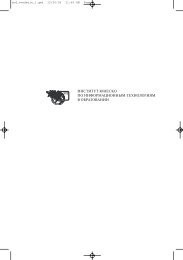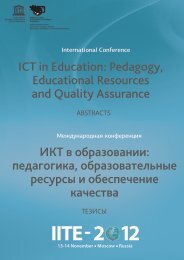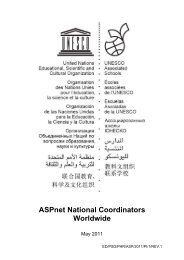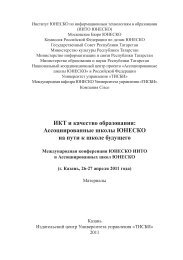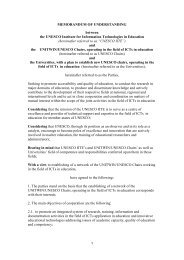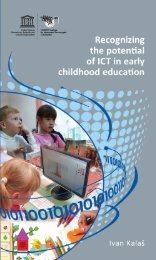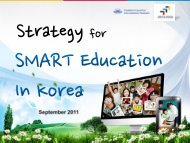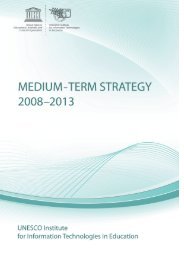UNESCO ICT Competency Framework for Teachers ... - unesco iite
UNESCO ICT Competency Framework for Teachers ... - unesco iite
UNESCO ICT Competency Framework for Teachers ... - unesco iite
You also want an ePaper? Increase the reach of your titles
YUMPU automatically turns print PDFs into web optimized ePapers that Google loves.
APPENDIX 1: <strong>UNESCO</strong> <strong>ICT</strong> TEACHER COMPETENCY FRAMEWORK MODULES<br />
OBJECTIVES<br />
TEACHERS SHOULD BE ABLE TO<br />
KC.1.a. Design, implement, and modify<br />
school-level education re<strong>for</strong>m programmes<br />
that implement key elements of national<br />
education re<strong>for</strong>m policies.<br />
KC.2.a. Identify and discuss how students<br />
learn and demonstrate complex cognitive<br />
skills, such as in<strong>for</strong>mation management,<br />
problem solving, collaboration and critical<br />
thinking.<br />
KC.2.b. Help students to use <strong>ICT</strong> to acquire<br />
the skills of searching <strong>for</strong>, managing,<br />
analyzing, evaluating and using in<strong>for</strong>mation.<br />
KC.2.c. Design units of study and classroom<br />
activities that integrate a range of <strong>ICT</strong> tools<br />
and devices to help students acquire the skills<br />
of reasoning, planning, refl ective learning,<br />
knowledge building and communication.<br />
KC.2.d. Help students to use <strong>ICT</strong> to develop<br />
communications and collaboration skills.<br />
KC.2.e. Help students develop both<br />
knowledge- and per<strong>for</strong>mance-based<br />
rubrics and apply them to assess their own<br />
understanding of key subject matter and <strong>ICT</strong><br />
skills. Help students to use these rubrics to<br />
assess other students’ work.<br />
EXAMPLE METHODS (FOR TEACHER EDUCATION OR<br />
PROFESSIONAL LEARNING)<br />
Discuss the intentions of national education re<strong>for</strong>m policies<br />
and ways that they could be implemented in school level<br />
programmes. Have participants work in teams to design a school<br />
level programme that would implement a component of national<br />
re<strong>for</strong>m policy. Have participants implement an initial phase of<br />
this programme, evaluate progress, and share challenges and<br />
strategies <strong>for</strong> overcoming challenges.<br />
Discuss the characteristics of complex cognitive thought<br />
processes and how students acquire and demonstrate these.<br />
Have participants identify the use of these skills in their own<br />
work. Have participants explicitly incorporate the acquisition and<br />
demonstration of one or more of these skills in a lesson plan.<br />
Have participants refl ect on implementing the lesson plan and<br />
offer suggestions <strong>for</strong> improvement.<br />
Discuss characteristics of effective in<strong>for</strong>mation-search and<br />
in<strong>for</strong>mation-management skills, and how <strong>ICT</strong>-based learning<br />
activities can support the development and demonstration of these<br />
skills; have participants generate examples of such activities.<br />
Discuss characteristics of reasoning, planning and knowledge<br />
building skills and discuss how <strong>ICT</strong>-based learning activities<br />
can support these skills; have participants generate and share<br />
examples of such activities. Have participants critique units of<br />
study and offer suggestions <strong>for</strong> additional resources.<br />
Discuss characteristics of communication and collaboration skills<br />
and how technology-based learning activities can support these<br />
skills; have participants generate examples of such activities. Have<br />
participants model effective communication and collaboration<br />
through participation in virtual professional learning communities.<br />
Discuss characteristics of self- and peer-assessment and of the<br />
knowledge- and per<strong>for</strong>mance-based rubrics used to refl ectively<br />
assess one’s own learning and that of others; have participants<br />
generate and evaluate examples of such activities and rubrics.<br />
Have participants develop knowledge- and per<strong>for</strong>mance-based<br />
rubrics that increase expectations <strong>for</strong> extending and expanding<br />
learning of key subject matter and <strong>ICT</strong> skills and concepts<br />
through the integration of emerging technologies.<br />
<strong>UNESCO</strong> <strong>ICT</strong> <strong>Competency</strong> <strong>Framework</strong> <strong>for</strong> <strong>Teachers</strong><br />
35



